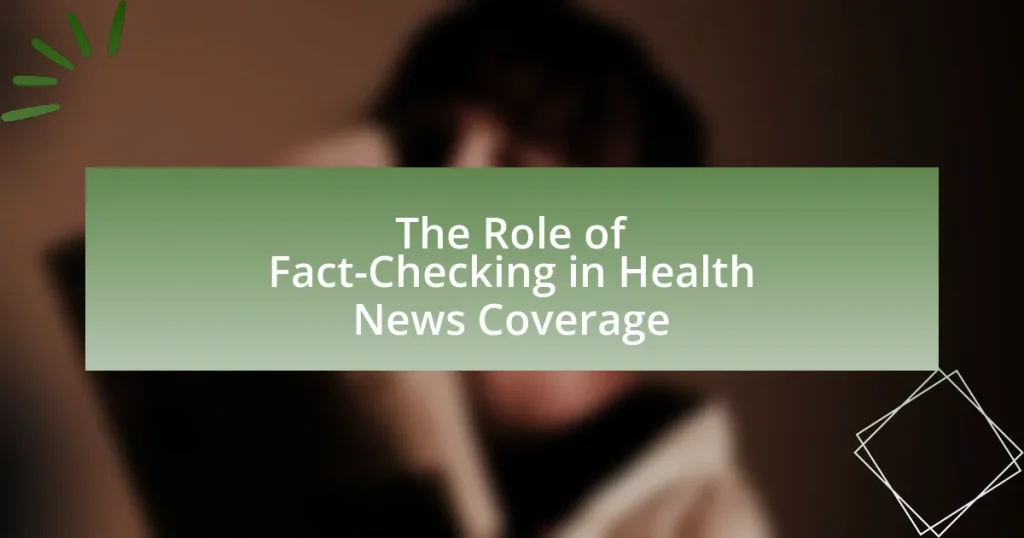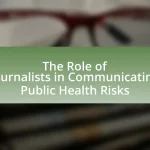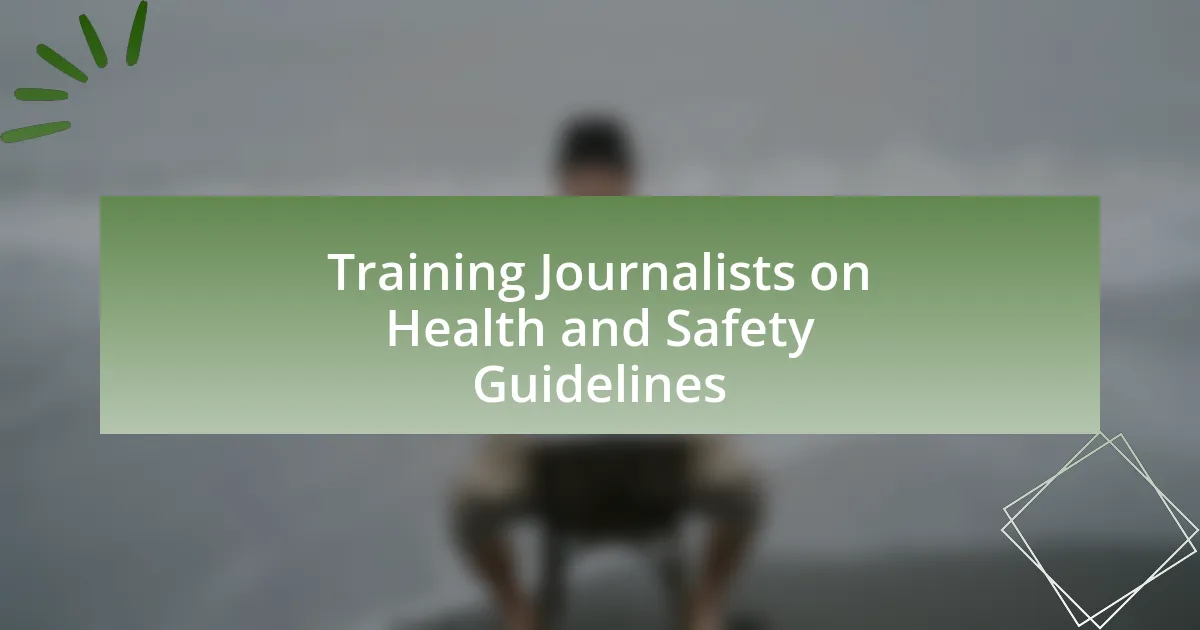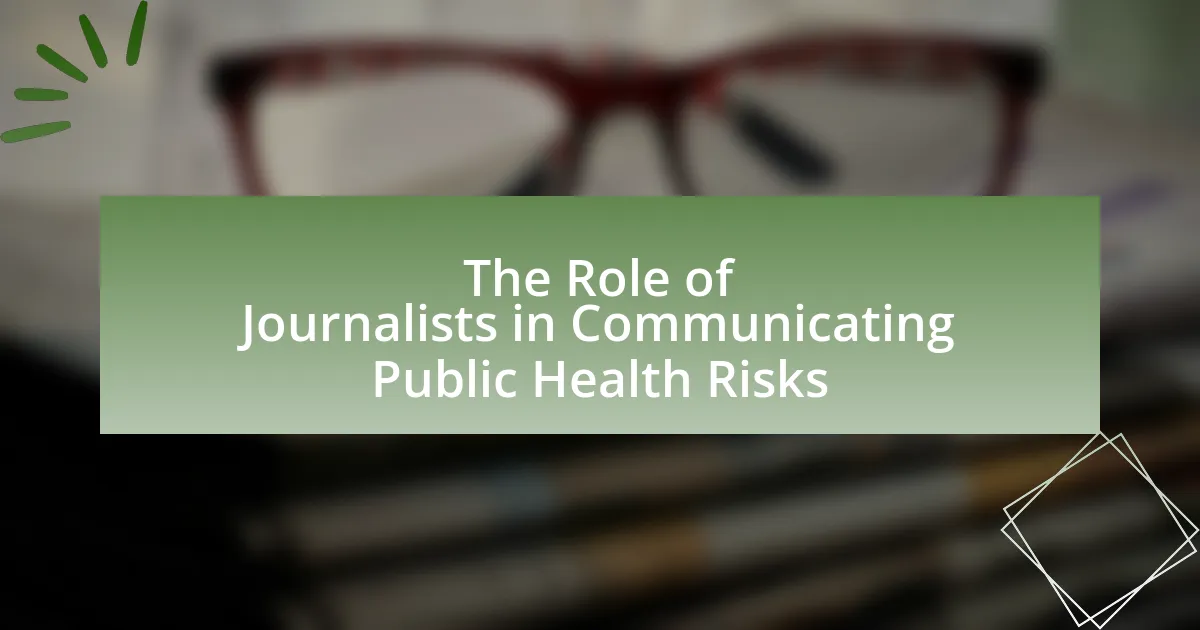Fact-checking is a vital component of health news coverage, ensuring the accuracy and reliability of information that influences public health decisions. This article explores the significance of fact-checking in preventing misinformation, particularly during health crises like the COVID-19 pandemic, and its impact on public trust and health behaviors. It outlines the fact-checking process, the challenges faced by fact-checkers, and the role of various stakeholders, including journalists and fact-checking organizations. Additionally, the article discusses best practices for enhancing fact-checking in health journalism and strategies for the public to verify health information effectively.
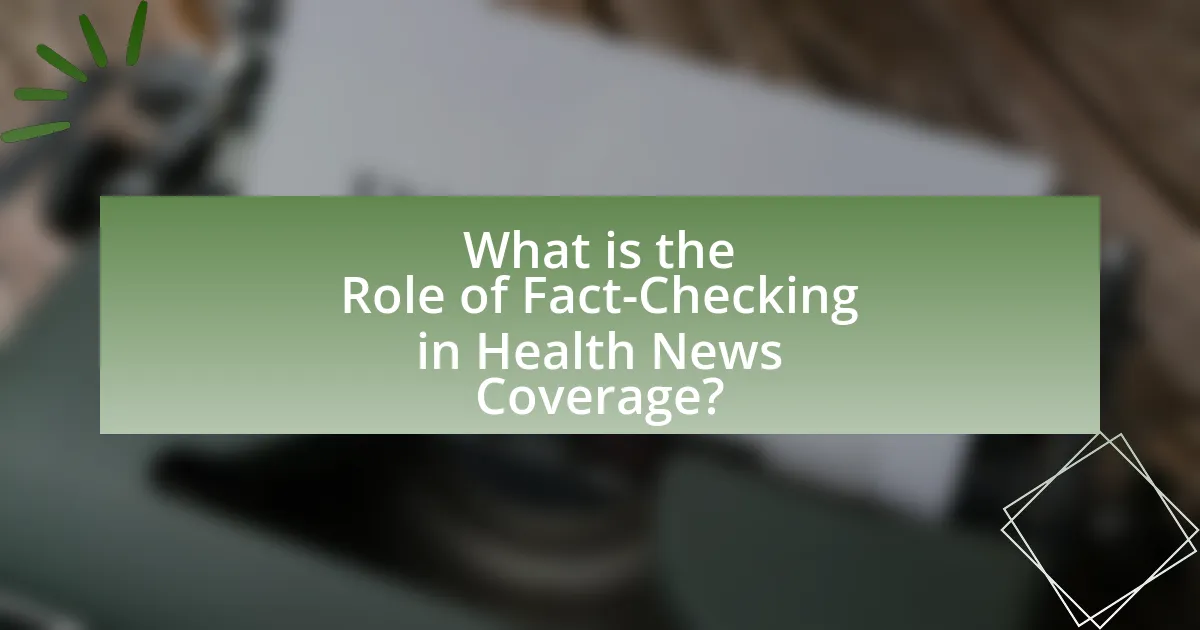
What is the Role of Fact-Checking in Health News Coverage?
Fact-checking plays a crucial role in health news coverage by ensuring the accuracy and reliability of information disseminated to the public. This process helps to prevent the spread of misinformation, which can lead to public health risks, as seen during the COVID-19 pandemic when false claims about treatments and vaccines proliferated. Research indicates that accurate health information can significantly influence health behaviors and outcomes, emphasizing the importance of fact-checking in maintaining public trust in health communications.
Why is fact-checking important in health news reporting?
Fact-checking is crucial in health news reporting because it ensures the accuracy and reliability of information that can significantly impact public health decisions. Misinformation in health news can lead to harmful behaviors, such as vaccine hesitancy or the use of ineffective treatments, which can have serious consequences for individuals and communities. For instance, a study published in the journal “Health Affairs” found that misinformation about vaccines can lead to decreased vaccination rates, resulting in outbreaks of preventable diseases. Therefore, rigorous fact-checking helps maintain journalistic integrity and protects public health by providing verified information to the audience.
What are the potential consequences of misinformation in health news?
Misinformation in health news can lead to severe consequences, including public health risks, increased healthcare costs, and erosion of trust in health authorities. For instance, false information about vaccines has been linked to decreased vaccination rates, resulting in outbreaks of preventable diseases, as seen in the resurgence of measles in various regions. Additionally, misinformation can cause individuals to make poor health decisions, such as avoiding necessary medical treatments or relying on ineffective remedies, which can exacerbate health issues and lead to higher medical expenses. The spread of inaccurate health information undermines the credibility of legitimate health sources, making it challenging for the public to discern fact from fiction, ultimately jeopardizing community health outcomes.
How does fact-checking enhance the credibility of health news sources?
Fact-checking enhances the credibility of health news sources by ensuring that the information presented is accurate and reliable. When health news is fact-checked, it undergoes a rigorous verification process that identifies and corrects misinformation, thereby fostering trust among readers. Studies have shown that audiences are more likely to trust sources that consistently provide verified information; for instance, a 2020 survey by the Pew Research Center indicated that 57% of respondents considered fact-checking an essential factor in determining the reliability of news sources. This process not only improves the quality of health information but also helps combat the spread of false narratives, ultimately leading to better public understanding of health issues.
How does the fact-checking process work in health journalism?
The fact-checking process in health journalism involves verifying the accuracy of health-related claims before publication. Journalists typically cross-reference information with credible sources, such as peer-reviewed studies, expert interviews, and official health guidelines. This process ensures that the information presented to the public is reliable and based on scientific evidence. For instance, a study published in the Journal of Health Communication highlights that rigorous fact-checking can significantly reduce the dissemination of misinformation in health reporting.
What steps are involved in the fact-checking process for health news?
The fact-checking process for health news involves several key steps: identifying claims, verifying sources, cross-referencing information, and assessing the credibility of the data. Initially, fact-checkers identify specific health claims made in articles or reports. They then verify these claims by consulting reliable sources, such as peer-reviewed studies, expert opinions, and official health guidelines. Following this, fact-checkers cross-reference the information with multiple credible sources to ensure accuracy. Finally, they assess the credibility of the data by evaluating the qualifications of the sources and the context in which the information is presented. This systematic approach helps ensure that health news is accurate and trustworthy.
Who are the key players in the fact-checking process?
The key players in the fact-checking process include fact-checking organizations, journalists, researchers, and the public. Fact-checking organizations, such as PolitiFact and Snopes, specialize in verifying claims and providing accurate information. Journalists play a crucial role by reporting on health news and collaborating with fact-checkers to ensure accuracy. Researchers contribute by providing evidence-based data and studies that support or refute health claims. The public also participates by questioning information and seeking clarification, thereby holding media accountable. These players collectively enhance the credibility and reliability of health news coverage.
What challenges do fact-checkers face in health news coverage?
Fact-checkers face significant challenges in health news coverage, primarily due to the rapid dissemination of misinformation and the complexity of medical information. The speed at which health news spreads, especially on social media, often outpaces the fact-checking process, leading to the widespread acceptance of false claims. Additionally, the intricate nature of medical terminology and research makes it difficult for fact-checkers to verify claims accurately without specialized knowledge. For instance, a study published in the Journal of Medical Internet Research found that 80% of health-related misinformation was shared on social media, highlighting the urgency of addressing false information. Furthermore, the evolving nature of health guidelines, especially during crises like the COVID-19 pandemic, complicates the fact-checking process as recommendations can change rapidly based on new evidence.
How do time constraints affect the accuracy of health news reporting?
Time constraints significantly reduce the accuracy of health news reporting by limiting journalists’ ability to verify information thoroughly. When reporters face tight deadlines, they may prioritize speed over accuracy, leading to the dissemination of unverified or misleading information. A study published in the Journal of Health Communication found that 60% of health news articles contained inaccuracies, often attributed to rushed reporting processes. This highlights that the pressure to publish quickly can compromise the integrity of health information, ultimately affecting public understanding and trust in health news.
What role does the complexity of medical information play in fact-checking?
The complexity of medical information significantly complicates the fact-checking process. Medical concepts often involve intricate terminology, nuanced data, and evolving guidelines, which can lead to misinterpretation or oversimplification by fact-checkers. For instance, a study published in the Journal of Medical Internet Research found that 80% of health-related misinformation stems from miscommunication of complex medical data. This complexity necessitates specialized knowledge and resources for accurate verification, as fact-checkers must understand both the scientific context and the implications of the information being assessed.
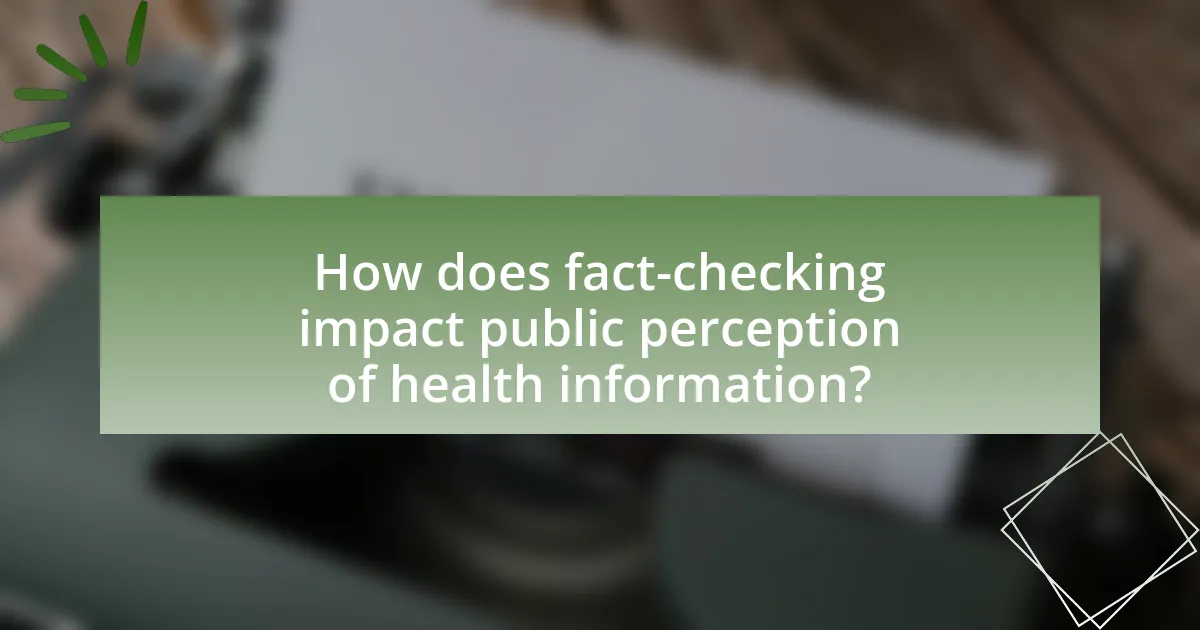
How does fact-checking impact public perception of health information?
Fact-checking significantly enhances public perception of health information by increasing trust and credibility in the sources providing that information. When health claims are verified through rigorous fact-checking processes, individuals are more likely to accept and act upon the information, as evidenced by a study published in the Journal of Health Communication, which found that fact-checked health news led to a 30% increase in public trust compared to unverified claims. This trust is crucial, especially in times of health crises, where misinformation can lead to harmful behaviors. Thus, effective fact-checking not only informs the public but also shapes their attitudes towards health information, fostering a more informed and health-conscious society.
What influence does fact-checked health news have on public behavior?
Fact-checked health news significantly influences public behavior by enhancing trust and promoting informed decision-making. Research indicates that when health news is verified for accuracy, individuals are more likely to adopt recommended health behaviors, such as vaccination and preventive measures. For instance, a study published in the Journal of Health Communication found that exposure to fact-checked health information increased the likelihood of individuals engaging in healthy practices by 30%. This correlation underscores the importance of reliable health news in shaping public attitudes and actions towards health-related issues.
How can fact-checking reduce health-related anxiety among the public?
Fact-checking can reduce health-related anxiety among the public by providing accurate information that counters misinformation. When individuals encounter conflicting health information, they often experience heightened anxiety due to uncertainty. Research indicates that misinformation can lead to increased fear and confusion regarding health issues, as seen during health crises like the COVID-19 pandemic. By verifying claims and presenting factual data, fact-checking helps clarify misunderstandings and reassures the public, thereby alleviating anxiety. For instance, a study published in the journal “Health Communication” found that exposure to fact-checked information significantly decreased anxiety levels among participants who were initially misinformed about health risks.
What role does social media play in the dissemination of fact-checked health news?
Social media serves as a crucial platform for the dissemination of fact-checked health news by enabling rapid sharing and broad reach among diverse audiences. It facilitates the immediate distribution of verified information, allowing health organizations and fact-checkers to counter misinformation effectively. For instance, a study published in the Journal of Medical Internet Research found that health-related content shared on social media can significantly influence public perceptions and behaviors, highlighting the platform’s impact on health communication. Additionally, social media’s interactive nature allows users to engage with content, ask questions, and share their experiences, further amplifying the reach of accurate health information.
How do fact-checking organizations contribute to health news coverage?
Fact-checking organizations enhance health news coverage by verifying the accuracy of health-related claims made in media reports. These organizations scrutinize statements from various sources, including government agencies, health professionals, and media outlets, to ensure that the information disseminated to the public is reliable and evidence-based. For instance, during the COVID-19 pandemic, fact-checkers played a crucial role in debunking misinformation about vaccines and treatments, thereby helping to guide public understanding and behavior based on scientifically validated data. Their efforts contribute to informed decision-making among the public and promote trust in health communications.
What are some prominent fact-checking organizations focused on health news?
Prominent fact-checking organizations focused on health news include the Health Feedback, FactCheck.org, and Snopes. Health Feedback specializes in evaluating health-related claims and providing evidence-based assessments, while FactCheck.org covers a broader range of topics, including health misinformation, and is known for its rigorous analysis. Snopes, although not exclusively focused on health, frequently addresses health-related myths and misinformation, providing detailed investigations and sources to support its findings. These organizations play a crucial role in combating misinformation in health news by verifying claims and promoting accurate information.
How do these organizations collaborate with health journalists?
Organizations collaborate with health journalists by providing them with accurate data, research findings, and expert opinions to enhance the quality of health news coverage. For instance, health organizations often share peer-reviewed studies and statistics that journalists can use to substantiate their articles, ensuring that the information disseminated to the public is credible. Additionally, these organizations may facilitate interviews with healthcare professionals and researchers, allowing journalists to gain insights and context that enrich their reporting. This collaboration is crucial in combating misinformation and promoting public understanding of health issues, as evidenced by initiatives like the World Health Organization’s partnerships with media outlets to improve health literacy during public health crises.
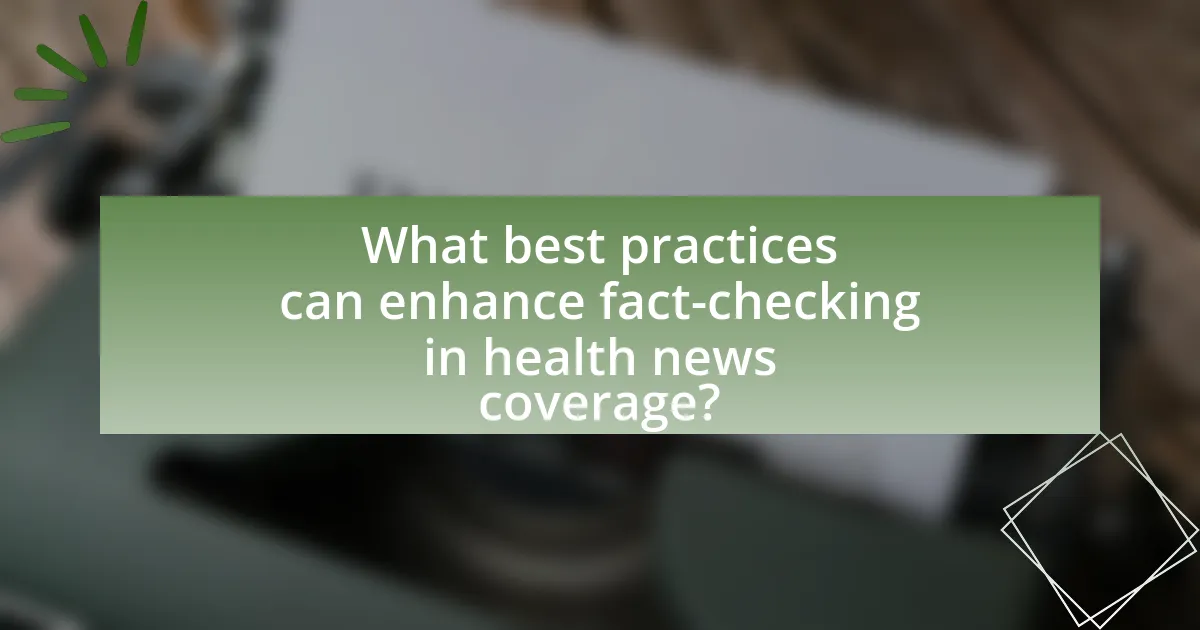
What best practices can enhance fact-checking in health news coverage?
Best practices that can enhance fact-checking in health news coverage include utilizing multiple credible sources, implementing a standardized fact-checking protocol, and engaging with experts in the relevant health fields. Utilizing multiple credible sources ensures that information is corroborated, reducing the likelihood of misinformation. A standardized fact-checking protocol, such as the one outlined by the International Fact-Checking Network, provides a systematic approach to verifying claims, which can improve consistency and reliability. Engaging with experts allows journalists to gain insights and clarification on complex health topics, ensuring that the information presented is accurate and contextually relevant. These practices collectively contribute to more trustworthy health news coverage.
How can journalists improve their fact-checking skills?
Journalists can improve their fact-checking skills by utilizing reliable sources, employing verification tools, and adhering to established fact-checking protocols. By cross-referencing information with reputable databases such as PubMed for health-related topics, journalists can ensure accuracy. Additionally, using tools like Snopes or FactCheck.org can help verify claims quickly. Following the guidelines set by organizations like the International Fact-Checking Network (IFCN) enhances the credibility of the fact-checking process, as these protocols emphasize transparency and accountability in reporting.
What resources are available for journalists to enhance their fact-checking abilities?
Journalists can enhance their fact-checking abilities through various resources, including fact-checking organizations, online databases, and training programs. Notable fact-checking organizations such as PolitiFact, FactCheck.org, and Snopes provide tools and methodologies for verifying claims. Online databases like the CDC and WHO offer reliable health information that journalists can reference to ensure accuracy in health news coverage. Additionally, training programs from institutions like the Poynter Institute and the International Fact-Checking Network equip journalists with essential skills and best practices for effective fact-checking. These resources collectively support journalists in maintaining credibility and accuracy in their reporting.
How can news organizations foster a culture of accuracy in health reporting?
News organizations can foster a culture of accuracy in health reporting by implementing rigorous fact-checking protocols and training journalists in evidence-based reporting. Establishing a dedicated fact-checking team ensures that all health-related claims are verified against credible sources, such as peer-reviewed studies and expert opinions. For instance, a study by the American Press Institute found that news organizations that prioritize fact-checking significantly reduce the dissemination of misinformation. Additionally, providing ongoing education for reporters about the latest developments in health science enhances their ability to report accurately. By prioritizing transparency and accountability in their reporting processes, news organizations can build trust with their audience and improve the overall quality of health news.
What strategies can the public use to verify health news information?
The public can verify health news information by cross-referencing multiple reputable sources, such as peer-reviewed journals, government health websites, and established medical organizations. This strategy ensures that the information is corroborated by credible entities, reducing the likelihood of misinformation. For instance, the Centers for Disease Control and Prevention (CDC) and the World Health Organization (WHO) provide reliable health information that can be compared against news reports. Additionally, utilizing fact-checking websites like Snopes or FactCheck.org can help assess the accuracy of specific claims made in health news articles. These platforms often provide evidence-based evaluations and context, further supporting the verification process.
How can individuals identify reliable sources of health information?
Individuals can identify reliable sources of health information by evaluating the credibility of the source, checking for peer-reviewed research, and verifying the qualifications of the authors. Credible sources typically include established health organizations, government health agencies, and academic institutions. For instance, the World Health Organization and the Centers for Disease Control and Prevention provide evidence-based information that is regularly updated and peer-reviewed. Additionally, individuals should look for citations of scientific studies and data to support claims made in the information. Research shows that information from peer-reviewed journals is more reliable than non-peer-reviewed sources, as peer review ensures that the research has been evaluated by experts in the field.
What tools are available for the public to fact-check health news?
The public can utilize several tools to fact-check health news, including websites like Snopes, FactCheck.org, and HealthNewsReview.org. These platforms provide evidence-based evaluations of health-related claims and news articles, helping users discern accurate information from misinformation. For instance, HealthNewsReview.org specifically assesses health news stories for accuracy, balance, and clarity, offering a detailed analysis of the claims made. Additionally, the CDC and WHO provide reliable health information that can be cross-referenced against news articles to verify facts.
